07Rangarajyam
Posted Date : 06:00 (03/07/2018) Jul 3, 2018 Sakthi Vikatan
Author: Indira Soundarrajan. Images: M.S
Revised on Nov 12, 2018
Dharma Varma hearing the bellowing of the cow from the Tapasvin’s garden felt it was an auspicious sign. He believed that the Munis’ sayings will come true. The wheel of time started spinning.
In Ayodhya, Rama, Lakshmana, Bharata, and Śatrughna were past their childhood and became young adults. Vasiṣtar was their Guru and taught them a wide range of subjects. He also showed them the procedural elements in the worship of Praṇavākāram.
Vasiṣtar took all four and stood them before Perumāḷ. When the temple priest smelled Manōraṅjitam flower on Rama, the same flower decorating Perumal, he felt tingles on his body. The unguent smells as from Ādiśeṣa emanated from Lakshmana causing surprise in the priest. (Meaning: Rama is the incarnation of Perumāḷ and Lakshmana was the incarnation of Ādiśeṣa.)
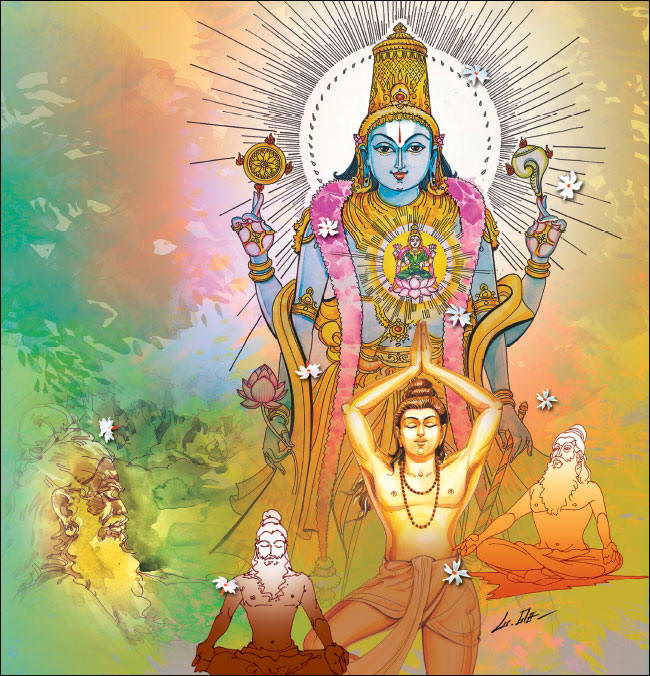
Figure 1மனோரஞ்சிதம் பூ = Cananga Odorata. . https://goo.gl/mMjJ7d Ylang Ylang flower.
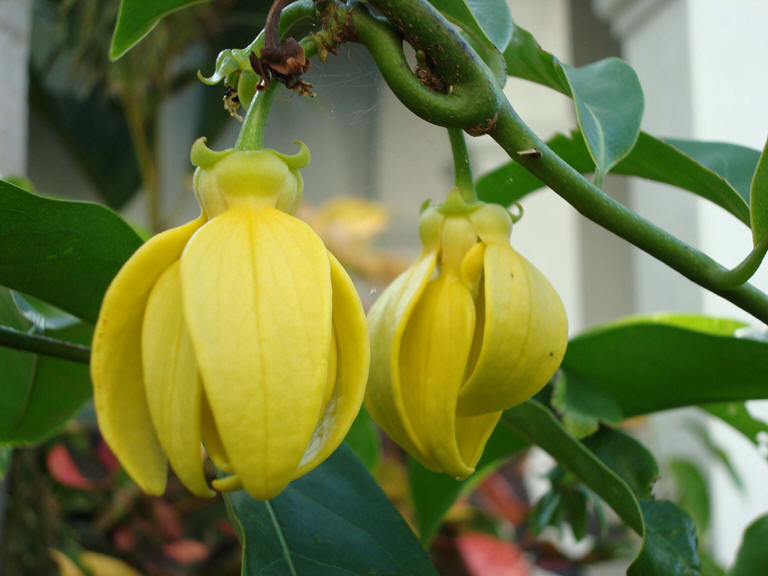
The priest had no clue that Rama and Lakshmana were Avatars on earth. Since Vasiṣtar was a Brahmaṛṣi, he discovered the connection and told Rama, ‘you should continue to worship Perumal after your father.’ ‘You are the pathfinder in the worship of Perumāḷ. Your lineage started with Vaivasvata Manu, and the future will determine whether your followers are your progeny or the people of the world. Let me give you the list of erstwhile eminent people who paid homage and worshipped Perumāḷ.
Vaivasvata Manu, Ikṣvāku, Kākuththan, later Māntātā, Musukuntan, Sipi Chakravarty, the Sakaras, Bhakiratan, Raghu, Ambarīṉ, Nakulaṉ, Yayāti, Dilīpaṉ, Ayaṉ…were your predecessors. Ayaṉ and Indumati are your grandparents and the parents of your father, Dasaratha. All the said ancestors belonging to the Solar race paid homage and worshipped this Perumāḷ. Māntātā = A child, not a product of fertilization of ovum and sperm in the womb but a product of the flesh in the thigh. It sounds like cloning.
Vasiṣtar: You can join them for worship. There are differences in the mode of prayer between you and them. Yours (Rama, the Avatara) is like worshipping yourself. The future worships reflect the wisdom of realizing ‘I am Brahman.’ Nothing more I could say. I cannot say anything that you don’t know yourself. Vasiṣtar continued. Rama! In this worship, let your holy hands touch this divine holy body of Praṇavākāra Araṅganātha Perumal. That touch for time immemorial establishes the Vaikunta divinity to this sacred body.
Rama in the guise and spirit of servile devotee desired to perform the ritual ablution of Praṇavākāra Araṅganātha Perumal with his own hands. His brothers helped Rama in his effort.
Lakshmanan passed on the milk vessel for Abhiṣēkam, Bharata the honeypot, Śatrughna the rose water. The four brothers performed the ablution. It was like the personified four Vedas offering prayers to the merciful creator. Vasiṣtar standing aloof enjoyed seeing the heart-warming sight. He was even-minded, being a Brahma-Jñāṉi. He was joyous to note the gracious act of Parantāmaṉ.
Vasiṣtar knew one truth well. Self-worship and homage to oneself are one -self-spin in place. The next self-spin in place is for Bhagavan's created beings coming back to him (liberation and merger). The wheel of time spun in anticipation of that day of emancipation. Lanka! You may call it Ravana Pattinam (Ravana’s city). Dharmavarma’s devotion and austerity are the first cause in the formation of Tiruvaraṅgam the Divine First Country (territory). The second cause is Lanka and its ruler Ravana.
There are significant differences between seeing Ravana through the prism of Ramayana and Ravana as an individual. Only when we know Ravana in totality, we can know Vibhīṣaṇaṉ. When we know Vibhīṣaṇaṉ, we can know Tiruvaraṅgam in its subtle purity.
Let us find out who Ravana is. Ravana’s beginning starts from Brahma. Among the sons of Brahma, Pulastya is incomparable. His consort is Āvirppū. Visravasu is their son. Visravasu is the father of Ravana, Vibhishana and Kumbhakarna. Their mother is Kaikesi.
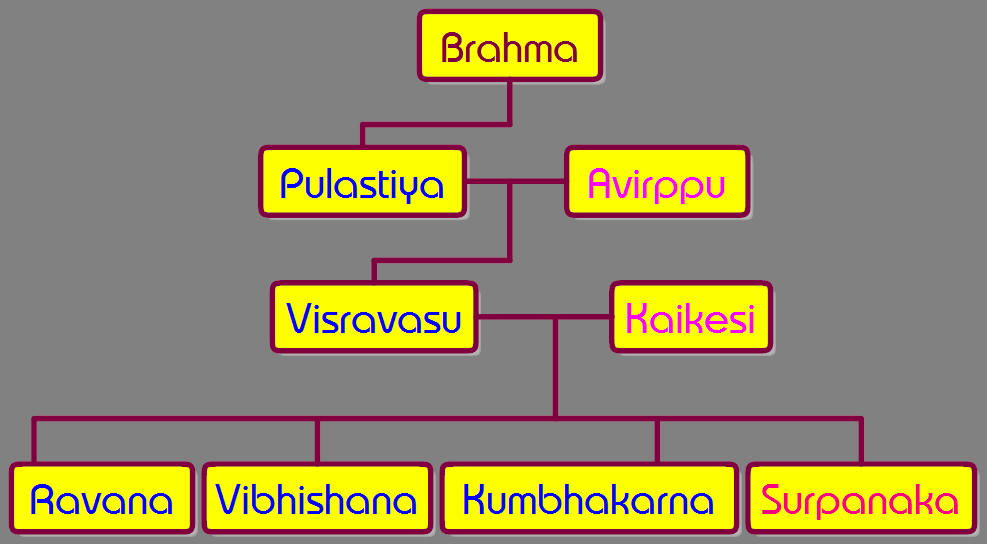
Kaikesi wanted to make Ravana the emperor of the world. Her other children were Vibhisana, Kumbakarna, and Surpanaka. To claim Kubera’s wealth, she asked Ravana to perform Tapas. It was not an ordinary Tapas. He cut his head one by one and offered it as an oblation in the fire. Brahma became compassionate, appeared before him and said to him, “What boon do you ask for?”
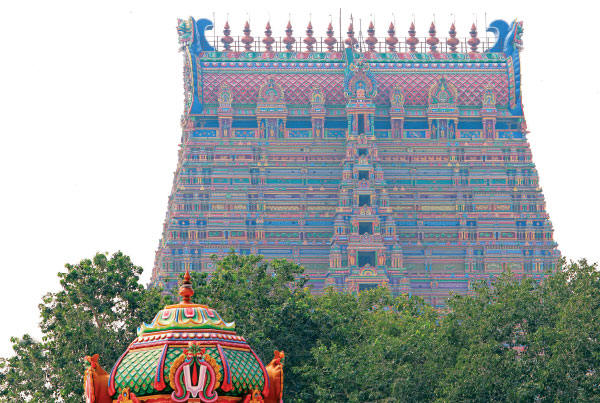
Ravana: None other than humans shall cause me death. I want all heads and hands offered in the sacrifice as an oblation, should be restored. Brahma blessed him with his request and disappeared. He usurped the wealth of Kubera forcibly. He did not want to get it as a boon from Brahma.
Kubera owned Lanka, designed, built and maintained by Mayan, the architect of the Asuras. Ravana threatened and subdued Kubera usurping Lanka. Kubera was Ravana’s half-brother, born to his aunt, Iḷi. He seized not only Lanka but Kubera’s Pushpaka Vimanam (airborne car), Sanganidhi (Blue-flowered crotalaria), Pathumanidhi (Lotus treasure) and such treasures beyond any calculations of their worth. Ravana took them for himself. Ravana married the Mayan’s daughter Maṇḍodari.
Ravana performed severe penance requesting Siva to preserve and protect his beautiful Lanka from destruction. Siva appeared before him, gave him a crystal Lingam sanctified with Siva’s grace and gave him the boon, “Offer worship to this sanctified Crystal Lingam in your country, which will not be destroyed by anyone. No one can vanquish you.”
Opposing installation, consecration, and worship of the crystal Lingam in Lanka by Ravana, Indira the chief of gods thought if Ravana took the crystal Lingam to Lanka, he would enslave everyone becoming the world conqueror and ruler.
Ganesa Outwits Ravana.
The background and the conditions of the crystal Lingam. There were two conditions: One should not touch it with unclean hands. Once it is put down on earth, it will establish itself as the resident god with the temple in situ (in that location). There was no way it could be moved or displaced. Hoping to make use of these two conditions in subversion, Indira went to Vinayaka Peruman and asked for help. A plan was put in place. Vinayakar was walking towards Ravana in the guise of a child and created a condition of urgent micturition in Ravana. His urinary bladder was bursting-full. He had to go. Unable to hold back his urination, he gave the crystal Lingam to Vinayaka telling him to hold it in his hands and not to put it on the ground. He left the child with the crystal in his hands. But Vinayakar put the Lingam down on the earth. On return, Ravana questioned the child, who answered that he could not bear the weight and the burden of the crystal and so he laid it on the ground. Since Ravana had to go, his hands were defiled from urination, and thus he could not hold the Lingam. That is why he gave the Lingam to Ganesa. Ravana satisfied the first condition: Clean Hands. Could Ravana have put it on a secure tree branch, so it was off the ground on a tree? Why did he not do it?
Ravana could not move the Lingam though he tried hard. That spot became the Siva Shrine. Ravana returned to Lanka, disappointed. But he engaged in pomp and pageantry.
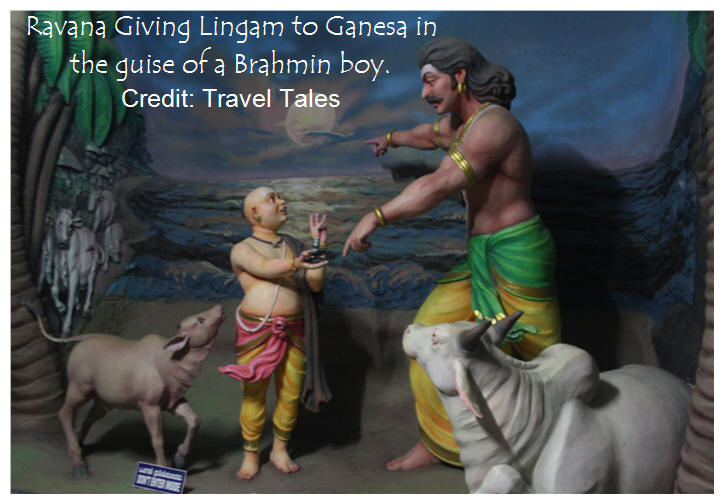
He took a great delight flying all over in the aerial car, he confiscated from Kubera. Once he tried to fly over Siva’s Kailas but was prevented by Nandi deva (the Sacred Bull of Siva). Ravana cast a curse on Nandi and made him take the face of a monkey. Nandi became fearful and cursed Ravana that his town will be destroyed one day by a monkey.
Image of Ravana trying to move Kailas and getting crushed: Wikipedia

Incorrigible and malignant Ravana lifted Kailas to demonstrate his strength. Seeing this mischief, Sivaperuman pressed down the Kailāsgiri with his big toe, which crushed his hand, made him yell and cry. He earned the name Ravana which means ‘he who roared and cried.’ Vākīsa Muni passed that way and advised him to chant Sāma Veda, which pleased Siva. Siva released his hand from pressure. He continued to err because of his egoism of I-ness. Vēdavati was a woman in Tapas. Ravana approached her with thoughts of carnal pleasures. She cursed him saying his Kulam will be annihilated. In 99 months, he performed Tapas in the Pātāḷa (Underworld), vanquished Varuṇa, seized the Pāsam, vanquished Varuṇa’s son and took his wife to Lanka.
Rambhai was the wife of Kubera's son Naḷkūbharan. In a way, she was his daughter-in-law. Ravana did not leave her alone. She went to Brahma and cried before him complaining. Brahma cast a curse on Ravana, “If you touch any unwilling woman, your head will explode.” This curse did not deter him. He picked a fight Kārthavīryārjunaṉ, who threw him in the jail. Pulathiyar got him released from the prison. When the Siva pūjā was in progress, he fought with Vāli and was jailed by him. Then he demonstrated his friendship to Vāli, who released him out of compassion. Once he prevented the sun from rising at dawn.
Knowing Mahavishnu was responsible for the imprisonment of king Mahābali, Ravana (Rāvanā) went to Vaikuntam and tried to fight with him. Considering the boons given to him by Brahma and Siva, Mahavishnu left Vaikuntam. He crowed saying Mahavishnu himself ran away from fear of him. Once he tried to fight with Māntātā, the grandfather of Srīrāma. Kālava Muni pacified Ravana and sent him on his way. He fought with Chandra and received Mantra Siddhis. He lived for 30.5 million years. Rama descended on earth to destroy him according to the stipulations of his truncated boon by Brahma.
Will Continue.
255-204-0